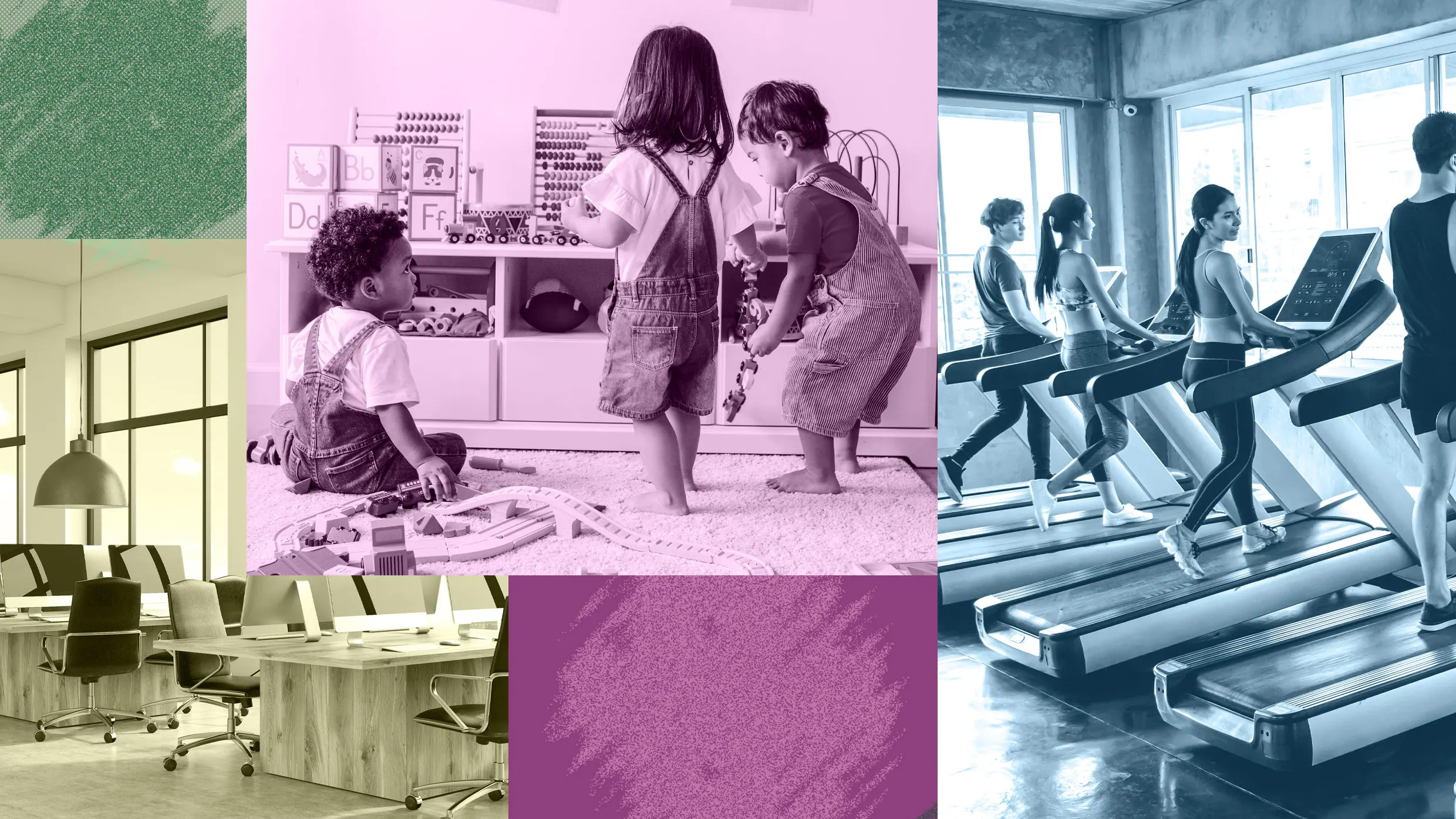
A few years back, Deanna Conley had just moved to Newport, Rhode Island with a 3-month-old and 3-year-old. She soon joined a focus group for a new type of club forming in her area.
This club—part daycare, part adult coworking space, and a little bit gym—would fulfill Conley’s post-moving needs: It offered community in a town where she knew no one, a space to work as a small business owner without an office, and affordable childcare. “The cost of a nanny was really prohibitive for us,” Conley says. Her older son had been in traditional daycare prior to the family’s move, but Conley thought this club might be a bit different.
“I was really interested in and excited about this new idea of whole family care,” she says, “versus just childcare.”
The club eventually became a daycare-gym-coworking hybrid workspace called Haven. It opened in Newport in 2019, and has since opened another location in Rhode Island and one in New Jersey. In January, Haven announced it’s franchising throughout the U.S. It, and other companies like it, may change how parents juggle work and kids.
Subscribe to the Daily newsletter.Fast Company’s trending stories delivered to you every day
Privacy Policy
|
Fast Company Newsletters
Per the Economic Policy Institute, childcare for one infant in the U.S. costs more than public college tuition in 38 states.
That, plus the reality that many people work remotely, makes the idea of a space that mixes childcare, coworking, and fitness needs appealing to parents. That’s especially true in a world where more remote work means people are parenting more in bubbles than in villages. While gyms such as the YMCA and Minnesota-based fitness chain Life Time provide childcare, typically they cap care at a couple hours—perfect for a workout, not so great for work. Haven offers a village for the price of daycare—with coworking and fitness opportunities thrown in.
“We can’t fix the high cost of childcare,” says Haven founder and CEO Britt Riley, acknowledging that early childhood educators deserve their pay. “But we can provide as much more value as we can.” She wants “to keep you in the workforce, help you feel close to your kids, [and] decrease your mom guilt.”
Reports found that in 2023, just 15.8% of business with 1,000 or more employees offer on-site childcare, while just 7.6% of medium-sized business do. Other spaces that combine daycare and coworking exist in the U.S. and abroad, but Haven, with several hundred members across its clubs, remains unique as a fully licensed childcare facility (for ages zero to five), meaning parents can leave the building without their children, that’s begun franchising. (Other coworking spaces with childcare avoid the time-consuming licensing process because parents remain on-site with their kids.)
‘Very much what young parents need’
In today’s professional landscape, remote work has grown arguably more common than affordable childcare. Haven was born “out of a need,” says Riley, who’d been looking for childcare for her 1-year-old and infant but couldn’t find anything she felt comfortable with that wasn’t too high cost. “I got stuck on this idea that there was something else we could do.”
Having worked in marketing at companies like Patagonia, Riley used her business acumen to attract investors, raising just under $20 million. She recently tapped a former Patagonia colleague to head Haven’s franchising efforts. Though Riley says regulations for childcare licensing are “extremely stringent” to ensure children’s safety, she prioritized giving members the ability to take meetings elsewhere (think coffee shops or clients’ offices) while their children stay at Haven.
Notably, Riley refers to Haven as a “club” (where membership costs between $650 and $2,500 a month) rather than a “daycare/coworking space.” The coworking space “is just an amenity that’s there for the parents,” she says. “Club” offered a way to describe a “community,” Riley adds, where parents can look out the window mid-workday and see their kids playing outside, or pop into a dark room for a massage after meeting with an on-site personal trainer.
Back in Rhode Island, self-employed business owner Conley has also relied on Haven for date nights. Her local Haven has hosted evenings in which members’ pajama-clad kids can eat, do crafts, and watch a movie while their parents go out for dinner.
“It felt to me very much what young parents need,” Conley says.
advertisement
Rethinking the ‘quick drop-off model’
Haven’s clientele includes military families, full-time remote workers, gig workers, self-employed people, and even parents who work at offices. Riley says those clients use the facility for a quick workout before bringing their kids home.
Haven’t isn’t the only coworking-slash-daycare in the game. MOMentum in suburban Pennsylvania caters to similar clientele. (Despite its name, dads account for about one-third of those working at MOMentum’s converted church building facility.)
Like Haven, MOMentum grew from a need. Cofounder Mary Beth Thomas says the after school childcare program at her kids’ school was a mandatory paid five days, when she needed fewer. She was also looking for an alternative to the quick drop-off model in the morning: “We want our kids to get used to the fact that their parents are nearby and they’re going to peek in on them, and it’s not something that causes anxiety,” Thomas says. “It’s more of a comfort.” At MOMentum, which costs between $1,520 and $1,690 per month for full-week attendance, parents can join their kids for a music class, or eat lunch with them.
MOMentum has just one location that offers childcare and coworking, and though Thomas has gotten inquiries about franchising, she prefers to keep the business local. “We’re more grassroots,” she says. “We want other people to come up with something that meets the needs of their community,” she says, and not something “just cloning MOMentum.”
When Lauren Perrett opened BubbaDesk in November 2022 in Australia, she says there were no similar offerings. “Coworking and childcare were seen as completely separate categories,” she says. Instead of trying to compete with daycare, Perrett adds, her company pursued a new category that she calls “close-proximity care integrated with coworking.” BubbaDesk’s individual subscription membership costs up to $175 AUD ($115 USD) a day, and businesses like Canva and a large Australian bank have purchased memberships for their employees. (Haven offers corporate packages, too.)
A spreading model
While BubbaDesk’s model resembles Haven’s more closely than MOMentum’s, with eight locations across Australia, Perrett is concerned that franchising could compromise its standards, which are so important when it comes to keeping children safe and cared for.
“Quality, safety, and culture are nonnegotiable, and the integrated nature of our spaces makes centralized training and oversight essential,” she says.
To ensure Haven preserves its culture and safety standards, Riley speaks with all serious owner candidates personally. As much as she wants Haven’s availability to spread, she’s looking to keep the ecosystem cohesive, with a 2-by-3-foot poster proclaiming its values at each club. She calls the model, per the poster, “a blend of a wise mentor, a compassionate friend, your most supportive and loving family member.”
Haven started awarding franchises in the second quarter of 2025. Riley won’t say how many have been awarded so far, but they “go as far west as Illinois,” with most in New England and Mid-Atlantic states. Even people in countries known for their progressive childcare policies, like in Scandinavia, have asked about opening Haven locations.
For now, Riley envisions parents one day being able to travel with their children and work from Havens around the world.
“It’s such a beneficial way of looking at childcare as whole family care,” says Conley. “Rather than parents in this rat race, trying to figure out schedules and hours and payments.”



